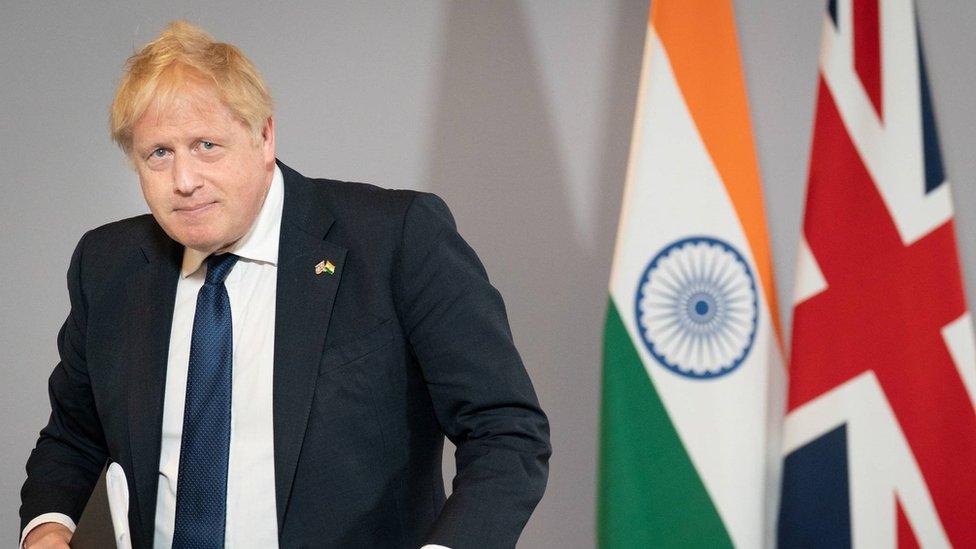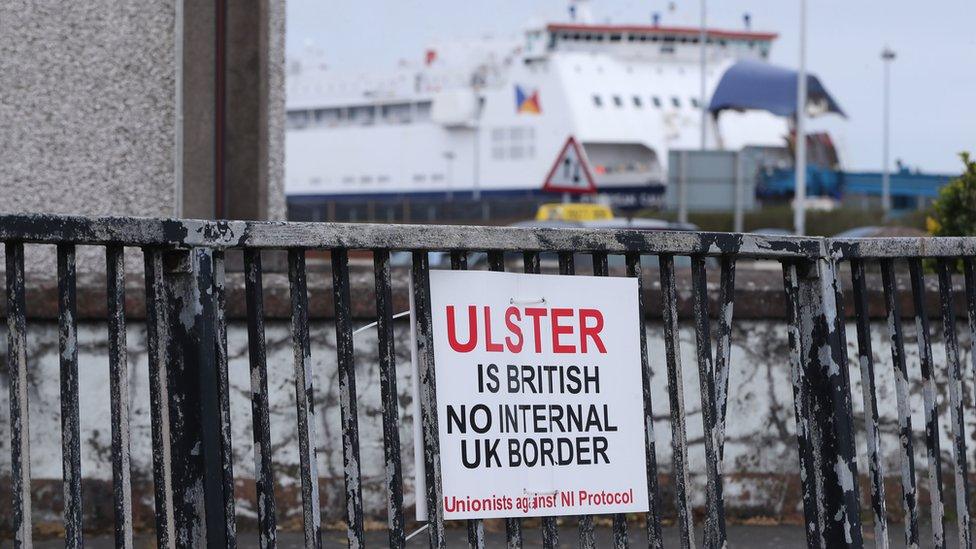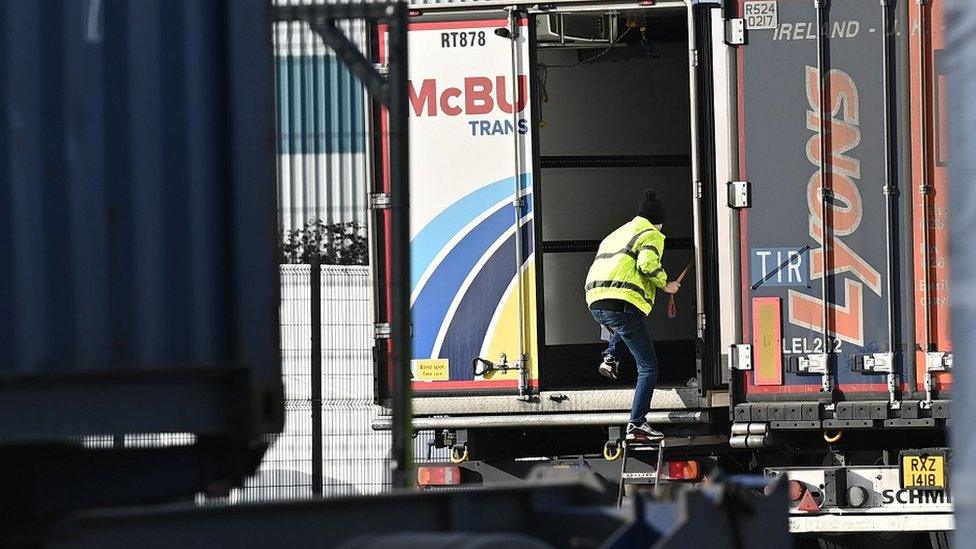Brexit: Boris Johnson not ruling out law to override protocol
- Published

Boris Johnson has not ruled out a law to override the protocol
The prime minister has not ruled out a new law which would give UK ministers powers to override the Northern Ireland Protocol.
The Financial Times reported that draft legislation could be published in May.
The protocol is the Brexit deal that prevents a hard Irish border by keeping Northern Ireland inside the European Union's (EU) single market for goods.
It creates a new trade border between Northern Ireland and the rest of the UK.
This is something the EU accepts is causing difficulties for many businesses.
Boris Johnson was asked about the newspaper story during a visit to India on Friday.
'We have to fix that'
Mr Johnson said the UK would continue talking to the EU to seek reforms to the protocol but "we don't rule out taking further steps if that is necessary".
"This is something that has been a consistent issue for the UK government and I think it's very simple.
"It's about the balance of the Good Friday Agreement and because of what is happening, it would be fair to say, that the protocol really does not command the confidence of a large large component of the population in Northern Ireland.
"We have to address that, we have to fix that."
Asked if that could include new legislation, he replied: "Of course. That goes without saying."
Article 16 of the protocol already gives the UK or the EU the right to introduce "safeguard measures" if the deal is causing serious difficulties which are liable to persist.
But a new UK law would go much further than that, giving UK ministers broad discretion and reduced risk from legal challenge.
The EU would be likely to view the move as a serious breach of the deal.
The Financial Times suggested the law would, for example, give UK ministers the right to disregard the outcome of a Stormont consent vote on the protocol.
Under the terms of the current deal the Stormont Assembly gets to vote every four years on whether the main provisions of the protocol should continue.
Reacting to the story, the Ulster Unionist Party (UUP) leader, Doug Beattie, said he had "no trust" in what the UK government was doing and questioned the timing just two weeks before an election.
"If they're serious in this then they're going to have to put measures in place to make that sure we can deal with the issues that's going to come out at the other end of it.
"If they're going to bring forward a Northern Ireland act which deals with this issue then let's see it. Let politicians here in Northern Ireland see this and add value to it, as opposed to them just thinking: 'This is what we should do because we think it's right'."

The protocol was agreed by the UK and the EU in October 2019, a series of so-called "grace periods" means it has never been fully implemented
Sinn Féin's Conor Murphy said the UK government had been taking "reckless actions" by "riding coach and horses through agreements they made in their own interests and not in the interests of the people here".
"We cannot afford to spend another six or nine months that the British government are going to legislate, upend everything, that we understand in terms of the agreement that they've come to with the European Union, and there needs to be international pressure applied to them.
"Any action that the British government have taken have been about their own selfish interests, regardless of how reckless they have been. Regardless of how they've broken through agreements, how they've threatened to break international law, and we can't live in this type of uncertainty."
'Same old story'
Social Democratic and Labour Party (SDLP) leader, Colum Eastwood said it was "the same old story" from the prime minister.
"He doesn't care about Northern Ireland, he cares about himself and his own position and that's what anyone engaging with him from the unionist side should understand by now.
"At some point this British government and the European Commission have to come to an agreement. That will not please the DUP because they want to rip everything up. The reality is the protocol is a massive opportunity for our businesses and our economy and we should be grasping it."
DUP leader Sir Jeffrey Donaldson said the new law is "just speculation" at the minute but that he will believe the government when he actually sees such legislation put forward.
"The state opening of parliament and the Queen's speech will take place on 10 May and that will give us a clear indication as to whether the government indeed intends to include legislative proposals to remove the protocol," he said.
"Clearly that's what we are pushing for and everyone knows our position that we are strongly opposed to the protocol.
"This is harming every household in Northern Ireland, it is driving up the cost of prices in our supermarkets and impacting on the cost of living crisis."
'Counter-productive'
Stephen Farry, deputy leader of the Alliance Party, accused the prime minister of "pandering to voices of extreme unionism in Northern Ireland".
"We've heard similar rumours before and once again we're seeing the threat of unilateral action on the protocol and any such action would be counter productive and self-defeating for the government," Mr Farry said.
"The only way to resolve what are some genuine issues with the protocol are through negotiations between the UK and the European Union, because any changes have to be agreed mutually between the two parties under international law.
"We also have to give certainty and stability to businesses here, that they're operating in what is a secure and legal environment, otherwise it places everyone in jeopardy and undermines prospects of investment in Northern Ireland."
The protocol was agreed by the UK and the EU in October 2019.
A series of so-called "grace periods" means it has never been fully implemented.
Earlier this month the EU changed its laws to ensure Northern Ireland could continue to import medicines from the rest of the UK.
The supply of medicines had emerged as one of the protocol's major difficulties, with pharmaceutical firms warning it would lead to withdrawal of products if not amended.
Related topics
- Published28 March 2022

- Published14 March 2022
